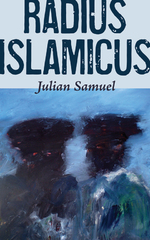Radius Islamicus by Julian Samuel, Guernica Editions, 2018
“The radius islamicus is the farthest distance a camel part is thrown from the blast centre.”
The narrator of Julian Samuel’s second novel is a “stateless” leader who supposedly spent more years of his life around airports than in any one country. An intellectual, he is now in his eighth decade, living close to former teammates who, under his direction, had conducted multiple projects including “the flash and bang in London” where the calculated radius of damage stretched to several metres. He was the “organizational brains behind it all,” and whereas his teammates from “various cellular backgrounds had been given an understanding of Islam,” he their leader, had helped them understand “a white fist in the face.”
Then, all of a sudden, they grew old and landed at the same residence in Pierrefonds. Perhaps it had been designed that way so that he could keep an eye on them and prevent them from making “death bed confessions,” either due to regrettable feelings of guilt or through the ubiquitous dementia.
Some of us, when we get older, feel bad about what we did and want to talk about it. I’m here to die as well as to make sure that there is no flow-out.
Who are these people? What are their names? What countries are they from? Where have they lived except at airports? Anver or Imran, Dr. Joseph Mcleod (as the narrator almost always calls himself), Gorgana or Usha, Tatjana and Nurse Linda with her five o’clock pills flow back and forth on Joseph’s memory screen, as do the lists of satire-filled names such as Fazool Samundur, Ms. Lal Chout, Imran Zindagee Ultaa, Kala Bazee, Safade Makudma and others. Descriptions of past and present life happenings are confused renderings of the failing mind of one reading from his diary, the “Radius Islamicus.” He relies heavily on pills to stabilize his memory, and describes himself as “decaying in Montreal” with “a fatal disease called old age:”
I’m a terrorist – non-convicted, thus innocent, thus a free citizen, thus a near-free citizen swaddled in the white cloth of occidental tyranny. Who these days isn’t a terrorist? One man’s terrorist is another man’s old folks home friend; one man’s terrorist is another’s transit lounge passenger.
Characters racked by sagging skin, limp penises, vascular diseases, diabetes, osteoporosis, cognitive impairment and a past buried under lost memories speak lines that flow like poetry:
I pull her into my arms. I notice that she has had a partial mastectomy…. Also, I see a small scar that a lumbar puncture has left. She is flesh, and she’s warm. She likes me. The tips of my fingers find the healed scars. We fall into a coma.
There is reference to Eliot’s Wasteland as “Muharram in Québec is the cruelest month.” Indeed, I myself have often thought how near impossible it might be to grasp the cruelty of the month from the plains of Sialkot. There is poetry in greying colours and wrinkles:
The magazines of nude young women have a beauty as well, but age produces a body with a different set of late wrinkle harmonics, a different sexual aggression antagonized by a flesh that yields, or not at all. We’ve developed together. Her toes, painted, shyly shine through the suds on the floor of the bathtub. Her bowl-shaped hips, now near-translucent folds of flesh, fall everywhere; her buttocks hang down in triplicate, white, creamy terraces seen only on faraway planets.
At one point, Joseph offers a deal to alter metro station names for “better cultural integration:”
I am sure not even a cheap copycat knapper would knapsack stops with Moslem names. Imagine Javid Chambers or Anver Ahmad knapping a metro stop with a name such as Hussain Hussaine. The current Prime Minister is thinking of changing Russell Square to Mohammad Ali Jinnah just for this reason. It is the only choice he has.
Finally, who writes our history? Is there a “view of the River Ravi from Pierrefonds?” Should there be one? Islamic culture in duffle bags? There is an ironic sting to it:
Islamic intellectuals translated the Greeks for Europe. Europe wouldn’t have TGVs or particle accelerators if the Arabs hadn’t translated Socrates for them. From Iberia, the Islamic scholars carried these old translations to the British Library in duffle bags.
Julian Samuel’s speculative novel shocks the reader while making her laugh and cry all at once. It is irreverent, sardonic and brutal, with body parts being blown to unrecognizable pieces. Nothing is sacred anymore. There are no gods except made-up ones for terrorists. Whatever smiles are there are the smiles of the near dead. It does not matter who falls as long as the donkeys are intact. All is fair as long as there is no disclosure during the “whimper” at the end – the one last blast before the final take off.
I would recommend this unusual novel to readers. I found it always clever, sometimes brilliant, beautiful and musical in parts.









